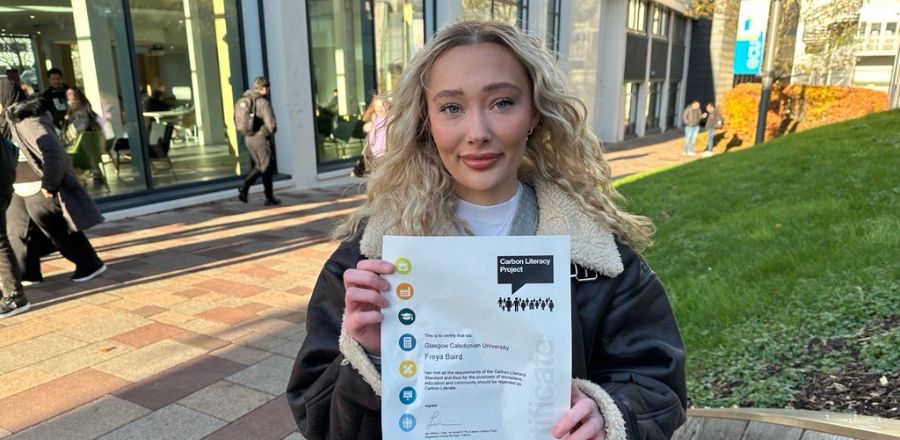Carbon Literacy Training comes to GCU

In collaboration with Glasgow School for Business and Society, the Sustainability Team have recently delivered Carbon Literacy Training to two groups of students from across the University.
The Carbon Literacy Project aims to educate people on their carbon footprint and teach individuals how they can make changes on an individual and community level to help protect our planet.
Final year Forensic Investigation student Freya Baird is one of the students who completed the training earlier this year. She said: “We looked in to heaps of stuff, but the main goal was just trying to educate people on carbon emissions, which it definitely did. One of the things that was emphasised was that you might think that your individual impact isn’t going to make a difference, but you can change that in so many ways, such as speaking to your friends and family to make a bigger difference.”
The training takes place over four two-hour long sessions with an individual assessment at the end. Freya explained that part of the assessment was to show and understanding of how the action you are pledging to take could be turned into a more impactful group action.
“I think the idea is that it starts off really small, but it’ll get bigger and bigger as more people talk about it, so in turn more people will actually reduce their emissions and hopefully it’ll start them reducing overall.”
Freya previously took part in an environmental course at school which aimed to get women involved with the renewable energy industry. Although this previous knowledge put her in good stead before undertaking the Carbon Literacy Training, she said that the training is for anyone, no matter what your background is.
“I signed up because I was looking into environmental internships and was thinking I could do something like this to get a bit more knowledge and to see if I even enjoyed this type of thing. My course it a bit more science based whereas the CLT was more about the larger impact of everything.”
“I think the way it was run was very, very accommodating. They’ll try and suit everyone if they can, but you have to want to do it and join the sessions and have some sort of input. I also really liked how personal it was, it’s not just this is a carbon footprint, it’s this is your carbon footprint, how can you improve it? I found out that my footprint was already pretty low, which I think would be the same for most students because as students we don’t have the money to be travelling around the world and having the heating on all the time. I’m from up north so my biggest one was probably travelling back home. I also eat a vegetarian diet which is a bit more carbon efficient anyway.”
Freya admits that one of her main motivations for signing up for Carbon Literacy Training was the career prospects that come along with it. In terms of future opportunities, the sustainability industry is ever evolving, and as she is graduating in 2025, her CV is high on her priority list.
“I think it looks good on a CV,” Freya explained, “as a student who is graduating, you’ve really got to think about your CV. It looks really good, and it’s not something that everyone else has on their CV either. It’s a shame that you need to think about it like that but even if that’s what makes people sign up, it’s still a chance to learn lots of important stuff from doing it so it’ll definitely be worthwhile.”
The training has opened Freya’s eyes to her impact on the environment in ways she hadn’t ever thought of, particularly with menstrual products. “I didn’t want to put anything in my assessment that might be stereotypical or repeated, so I did some of my own research when news was coming out about harmful chemicals in female menstrual products earlier this year. We had learned about how much water it takes to produce cotton t-shirts, so then I thought about how menstrual products aren’t too great for us but also are not good for the environment, so that became quite a main emphasis in my assessment. I pledged to maybe look for better alternatives for the environment, but also for a point of female health and safety.”
Alternative menstrual products are not the only influence Freya has taken from the training. She has also been influenced by the training to base her honours project around greener analytical chemistry methods.
She also added: “every year we get so many new students who have to buy their own lab coat, so maybe talking to programme leaders about recycling them or handing them down from students who have moved on. We also use plastic pipette tips which just get wasted and solvents also just get wasted too, so I think there’s definitely room for improvement there.”
MSc International Supply Chain Management student Usman Butt is another student who has taken part in the training. Usman said he signed up because “I really wanted to learn more about it, also from a careers perspective, sustainability is a really big thing right now and it is always a good idea for more awareness about it in general.
“We owe it to ourselves, our families and the future to do something. We have transparent information so let’s act on that information, we need to be reactive to what has happened before and be proactive for the future.”
Twelve students have been Carbon Literacy certified thus far, with more training set to take place in 2025. You can register for the training here to be the first to know when new dates for training have been set!
By Derry Wyllie
Got a story? Email us at studentcomms@gcu.ac.uk
